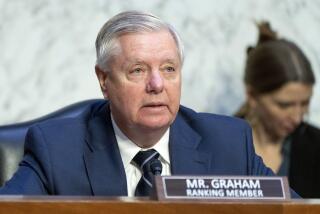Enron Report Could Bolster Criminal Case
- Share via
A report claiming that Enron Corp. executives used partnerships to enrich themselves and mask the company’s troubled finances makes it increasingly likely that prosecutors will bring criminal fraud charges, legal experts said Monday.
The report, released late Saturday by a special committee of Enron board members, said the partnerships appeared in some cases to be used for financial subterfuge rather than for legitimate business purposes.
If investigators can show that Enron officials intentionally deceived investors, it would mark a significant new development in the case, according to attorneys experienced in corporate fraud.
Enron executives would have a stronger defense had the report found that they simply made bad business decisions, attorneys said. Instead, the report charged that the now-infamous partnerships at the heart of Enron’s collapse often served no “bona fide economic” purpose.
“This report makes it more likely that there will be a criminal indictment,” said Christopher Bebel, a partner at Shepherd Smith & Bebel in Houston.
“It looks like the government’s going to have an easier time establishing intent, because now we’ve learned additional details about the efforts at concealment of the truth as the scheme was unfolding,” Bebel said. “And we’re learning about the extent to which members of top management profited.”
The report detailed a culture of corporate mismanagement and inside dealing. It pointed the strongest criticism at Andrew S. Fastow, Enron’s former chief financial officer, saying that he and several subordinates reaped tens of millions of dollars in profit at the expense of the company and its shareholders.
Fastow could not be reached for comment.
Some legal authorities cautioned that it was not certain criminal charges would be brought.
Though the report contains strident allegations, the three-member panel acknowledged that it did not have the full picture. Some key people refused to cooperate, and the panel lacked access to important documents.
Though the report appears to strengthen the government’s hand in bringing potential fraud charges, Enron executives still have a variety of defenses available, some authorities said.
Enron executives could argue that the partnerships were created and run with the full backing of lawyers and others upon whom they relied for expert advice, said Ira Lee Sorkin, a New York defense attorney who previously was at both the U.S. attorney’s office in New York and the Securities and Exchange Commission.
Sorkin noted that as a defense, Enron executives could claim that lawyers, accountants and others signed off on the deals.
Still, many experts said the report contains clearly damaging information that lowers the hurdle to bringing a criminal case.
Simply put, the difference between a civil case and a criminal one is intent, attorneys said. Prosecutors would have to prove that a defendant purposely broke the law as opposed to simply having acted “recklessly.”
With Enron, prosecutors could argue that Fastow and others were making millions while manipulating the company’s books, experts said.
“If the evidence is as strong as this report seems to make it, then I’d think it’s a pretty strong case,” said Paul Fishman, a New York lawyer who handles white-collar crime cases.
The report also hands the Justice Department extra ammunition with which to pursue its case, Fishman and others said. One major strategy in the investigation is to coax insiders to cooperate with information about the wrongdoing of others.
The report may convince some people that it’s better to cooperate before others do and they lose offers of leniency.
“There may be enough in [the report] that it may scare the pants off someone,” Fishman said.
If the allegations in the report bear out, the government could charge fraud on several levels, said Brian O’Neill, a partner at O’Neill, Lysaght & Sun in Santa Monica.
If the company was shuffling its finances while borrowing money from financial institutions, that could be bank fraud, he said. If it used the mail or electronic means to deceive investors, that could be mail or wire fraud.
The headline-garnering nature of the Enron debacle could itself increase the likelihood of criminal charges being brought, said Henry Hu, a securities-law professor at the University of Texas at Austin.
“This case has so gripped the attention of the general public that the failure to bring a criminal prosecution, if the facts warrant it, could undermine confidence in the financial markets,” Hu said. “The message it would send is that [criminal wrongdoing] doesn’t matter: ‘Even in an egregious situation, we won’t prosecute criminally.’”
More to Read
Inside the business of entertainment
The Wide Shot brings you news, analysis and insights on everything from streaming wars to production — and what it all means for the future.
You may occasionally receive promotional content from the Los Angeles Times.










